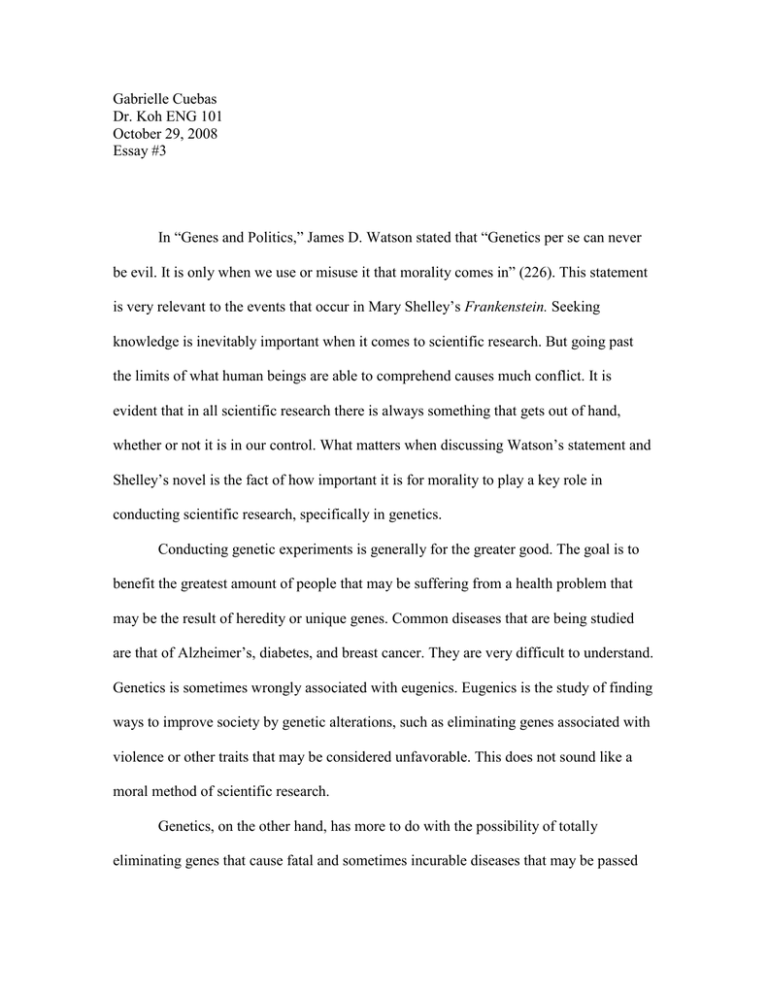Gabrielle Cuebas Dr. Koh ENG 101 October 29, 2008 Essay #3
advertisement

Gabrielle Cuebas Dr. Koh ENG 101 October 29, 2008 Essay #3 In “Genes and Politics,” James D. Watson stated that “Genetics per se can never be evil. It is only when we use or misuse it that morality comes in” (226). This statement is very relevant to the events that occur in Mary Shelley’s Frankenstein. Seeking knowledge is inevitably important when it comes to scientific research. But going past the limits of what human beings are able to comprehend causes much conflict. It is evident that in all scientific research there is always something that gets out of hand, whether or not it is in our control. What matters when discussing Watson’s statement and Shelley’s novel is the fact of how important it is for morality to play a key role in conducting scientific research, specifically in genetics. Conducting genetic experiments is generally for the greater good. The goal is to benefit the greatest amount of people that may be suffering from a health problem that may be the result of heredity or unique genes. Common diseases that are being studied are that of Alzheimer’s, diabetes, and breast cancer. They are very difficult to understand. Genetics is sometimes wrongly associated with eugenics. Eugenics is the study of finding ways to improve society by genetic alterations, such as eliminating genes associated with violence or other traits that may be considered unfavorable. This does not sound like a moral method of scientific research. Genetics, on the other hand, has more to do with the possibility of totally eliminating genes that cause fatal and sometimes incurable diseases that may be passed down through generations. Forget about changing social behavior, which involves eugenics. This is about ultimately saving the human race. People are living longer than ever before, so using genetics to cure diseases and even prevent them from happening would be a great scientific breakthrough. A problem that may arise from genetics is if people truly want to know what their human genome is like; if they truly want that information to be available to the public. There are people that have subjected themselves to genetics research and now “[regret it because they wish] they had been more forewarned of the potential perils of such knowledge” (224). One can’t help but think about the consequences of having others know this information. This may cause new reason for discrimination in the community and in the workplace. This can be associated with Victor Frankenstein’s creation in Shelley’s novel. Victor sought to discover the secret of life; he did so and realized the detriment of his choices. He chose not to take responsibility of his actions out of fear that his community would deem him insane. The “monster” that he created wreaked havoc across the town only because he deeply desired to have a companion because he was neglected by his creator. Although Victor’s intention may have been to benefit the public in his discovery of the secret of life, in hopes that he could prevent death, it ended up being that no one benefited from his experiment. His selfish acts were out of rage because his mother died. He acted immorally out of his desire to seek knowledge because it was solely for his benefit. He unleashed something that he may have been able to take control of had he considered the consequences, but he didn’t. He could have used the monster as way to enlighten the people of his town that there life can be created, even in more intelligent forms. But he did not want to teach people anything. There was no benefit to the greater good that could have been acknowledged. There is just some scientific research that can not be conducted. The bold statement Watson made earlier is quite truthful. Whether understood in fact, as in his passage of “Genes and Politics”, or in fiction, as in Shelley’s Frankenstein, “Genetics per se can never be evil. It is when we use or misuse it that morality comes in.” Genetic research can provide much scientific advancement in finding cures for and possibly eliminating diseases. While it is important to share knowledge with all, the fact of the matter is that any kind of scientific research should not be conducted if it does not benefit a majority. Certain information should not be made public if it is going to cause harm to anyone. The benefit factor should always outweigh the risk factor.

